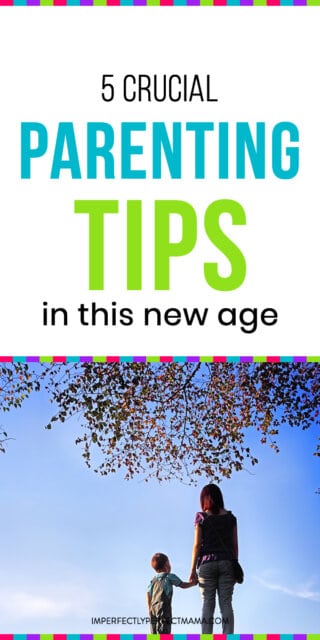I had a talk with my 8 year old today when I saw him visibly anxious about riding a bike.

We went on a walk.
I asked him questions, gave him space and safety, and we worked through it.
Mom win!
This is 24 hours after I yelled “What did I ever do to you!” at my tantruming 2- year old.
Sometimes we’ve got it and sometimes we don’t.
Figuring out how to parent during social media, pandemics, being a full-time working mom and more is hard!
We grow up learning from our parents, but face it – they lived in a different generation and while their parenting efforts can last through time, sometimes we need to change our ideas of parenting and adopt new strategies.
The following suggestions about how to relate to our children can also apply to any other relationship we have, including the one we have with ourselves.
1. Listen. Actually Be Quiet and Listen
Think about a time when you felt angry, wrongly accused, ignored.
That oh so awful sense of not being listened to.
I’m willing to bet you can conjure that feeling in your body even just remembering.
It feels hot and uncomfortable. Remember how you reacted?
Ready for battle to defend your honor aka “get a word in edgewise.”
When we do not feel heard, it feels like a complete affront to our souls and we often lash out.
I have witnessed (and been a part of) full on wars filled with interrupting, condescending tone, and threats to throw away favorite toys over something as insignificant as who last had the remote.
These molehills turned mountains leave everyone feeling stressed and no one feeling heard.
When our kids are trying to defend themselves in the form of increased volume, tearful “nuh-uh”s, and other seemingly defiant tactics, they are telling us the only way they can muster in that moment that they do not feel heard.
Slowing down and actively listening to their side of the story is an important way to build relationships, build trust and teach problem solving.
You get an opportunity to hear their experience, and instead of making theirs wrong and yours right, you can show them that even in conflict, they get a say.
Then together, you can get to the bottom of it and minimize the damage.
2. Reflect. Give Empathy, Not Alternative Feelings or Fixes
We are programmed to offer help when someone is hurt or upset.
Although that has good intentions, it often ends up invalidating and ignoring what is really needed, which is to be seen, understood, and known.
Not accepting what our children tell us they are feeling is detrimental to their sense of self worth.
If your son falls and scrapes his knee and tells you how bad it hurts, we may go directly to what our parents might have told us, which is likely some rendition of “Oh, you’re fine. Walk it off.”
Try shifting this into a reflection instead of an alternative way to feel and show that you were listening. Something like, “That looks like it hurts. Are you ok?” shows empathy.
Once you’ve acknowledged the experience, then offer things like encouragement and advice.
The pain doesn’t have to be physical, either. When my daughter says “I’m mad at you,” I want to tell her it hurts my feelings, because it does. She’s my baby and I’m her mommy and how dare she be mad at me?
But this is a time to first celebrate the use of feeling words instead of actions, and also to remember this isn’t about you. It’s about validating their experience and simply responding that you heard them.
“I see that you’re mad,” will do wonders for the length and volatility of the potential conflict.
Model the behaviors you want to grow in them.
3. Relate. Let Them Know They’re Not Alone
I discovered a magical de-escalation technique by accident one day when my son hit his funny bone and it was not at all funny.
In fact, it’s painfully numbing all the way down your arm, so trying to explain to anyone, let alone a child, that it’s supposed to be humorous (see what I did, there?), is just mean.
I immediately felt his pain and when I winced and said “Oh I know that hurts. I have done that so many times,” he stopped and asked “Really?” Letting him know he was not alone in his feeling of hurt was comforting.
It was enough to pull him right out of the spiral I saw him going into. No one wants to feel alone.
We, as parents, are constantly trying to save our children from pain by offering a solution (“here, try it this way”) or alternate feeling (“cheer up”). Sometimes these are appropriate responses. Sometimes they are not.
Read the room.
If a child has escalated beyond reason, they are not in a state to use higher order thinking skills.
They are either fighting, fleeing, or freezing. So just meet them where they are. Be there with them in that big feeling until it passes.
4. Ask What They Need. Don’t Make Assumptions
As parents, we think we know best.
And often, we do. But in conflict, when one or both of us may have likely “flipped our lid” it is a good idea to first slow down and notice if we are making assumptions about what our children need, want, and feel.
The simple question “What do you need?” will soften the moment, give the child a feeling of safety, and allow them to speak freely.
Don Miguel Ruiz wrote “It is always better to ask questions than to make an assumption, because assumptions set us up for suffering” in his book The Four Agreements.
I have found this tactic to be great in all relationships since I have a tendency to think I know exactly what everyone else is thinking.
When I am in a reactionary state, I interpret words, tones, and actions however I see fit, then make my perception irrefutable truth.
I’m often wrong. I’m not in their head and I don’t know everything going on in their world.
When we set our egos aside, whether we are dealing with adults or children, and just ask, we’ll see how easily we are let into someone else’s inner world.
5. Apologize. Repair
When we teach our kids to just say they’re sorry without explaining why, they are parroting our script and it is unlikely they understand the meaning of the word or the purpose of the exercise.
A watered down apology does not build trust when overused, less than genuine, and just a word. So if we want them to be sincere, we have to show them how.
The best apology is changed behavior.
Modeling vulnerability, accountability, and empathy may be a new tactic in discipline.
But it is well worth it.
Showing our children that we can let our guards down and intentionally fix the break in the relationship, followed by better behavior, will give them a good chance at healthy relationships throughout their lives.
Again, model the behaviors you want to grow in them.
These are probably different from how our parents treated our feelings.
So as we wire our children with empathy, we are rewiring ourselves, too. It’s important to remember that executive function and self regulation develop as we grow and we have to match our expectations appropriately.
Children are sponges.
They see and what we do, hear what we say and how we say it, and last but definitely not least, they feel what we feel.
Infants understand facial expressions and intonation.
They may not be talking yet, but they are demonstrating a fairly sophisticated understanding of human emotion.
Listen. Let your guard down. Own your mistakes. And repair.
These strategies will de-escalate, build trust, and strengthen all of your relationships.
Over to you – have you tried these parenting strategies with your little ones? Share in the comments!
Remember to pin me!




2 Comments